- Home
- Josephine Tey
The Man in the Queue ag-1
The Man in the Queue ag-1 Read online
The Man in the Queue
( Alan Grant - 1 )
Josephine Tey
The first of Tey's Inspector Grant mysteries concerns the murder of an unknown man, apparently struck down as he stands in a ticket queue for a London musical comedy. Grant tenaciously pursues his suspects throughout the length of Britain and the labyrinth of London.
The Man in the Queue Author
Josephine Tey
1 — Murder
It was between seven and eight o'clock on a March evening, and all over London the bars were being drawn back from pit and gallery doors. Bang, thud, and clank. Grim sounds to preface an evening's amusement. But no last trump could have so galvanized the weary attendants on Thespis and Terpsichore standing in patient column of four before the gates of promise. Here and there, of course, there was no column. At the Irving, five people spread themselves over the two steps and sacrificed in warmth what they gained in comfort; Greek tragedy was not popular. At the Playbox there was no one; the Playbox was exclusive, and ignored the existence of pits. At the Arena, which had a three weeks' ballet season, there were ten persons for the gallery and a long queue for the pit. But at the Woffington both human strings tailed away apparently into infinity. Long ago a lordly official had come down the pit queue and, with a gesture of his outstretched arm that seemed to guillotine hope, had said, "All after here standing room only." Having thus, with a mere contraction of his deltoid muscle, separated the sheep from the goats, he retired in Olympian state to the front of the theatre, where beyond the glass doors there was warmth and shelter. But no one moved away from the long line. Those who were doomed to stand for three hours more seemed indifferent to their martyrdom. They laughed and chattered, and passed each other sustaining bits of chocolate in torn silver paper. Standing room only, was it? Well, who would not stand, and be pleased to, in the last week of Didn't You Know? Nearly two years it had run now, London's own musical comedy, and this was its swan song. The stalls and the circle had been booked up weeks ago, and many foolish virgins, not used to queues, had swelled the waiting throng at the barred doors because bribery and corruption had proved unsuccessful at the box office. Every soul in London, it seemed, was trying to crowd into the Woffington to cheer the show just once again. To see if Golly Gollan had put a new gag into his triumph of foolery — Gollan who had been rescued from a life on the road by a daring manager, and had been given his chance and had taken it. To sun themselves yet once more in the loveliness and sparkle of Ray Marcable, that comet that two years ago had blazed out of the void into the zenith and had dimmed the known and constant stars. Ray danced like a blown leaf, and her link aloof smile had killed the fashion for dentifrice advertisements in six months. "Her indefinable charm," the critics called it, but her followers called it many extravagant things, and defined it to each other with hand-wavings and facial contortions when words proved inadequate to convey the whole of her faery quality. Now she was going to America, like all the good things, and after the last two years London without Ray Marcable would be an unthinkable desert. Who would not stand forever just to see her once more?
It had been drizzling since five o'clock, and every now and then a light chill air lifted the drizzle and half playfully swept the queue from end to end with it in one long brushstroke. That discouraged no one — even the weather could not take itself seriously tonight; it had merely sufficient tang to provide a suitable apéritif to the fare in front of them. The queue twiddled its toes, and Cockneywise made the most of whatever entertainment provided itself in the dark canyon of the lane. First there had come the newsboys, small things with thin, impassive faces and wary eyes. They had flickered down the queue like wildfire and disappeared, leaving behind a trail of chatter and fluttering papers. Then a man with legs shorter than his body laid a ragged strip of carpet on the damp pavement and proceeded to tie himself into knots until he looked as a spider does when it is taken unawares, his mournful toad's eyes gleaming now and then from totally unexpected places, in the writhing mass, so that even the most indifferent spectator felt his spine trickle. He was succeeded by a man who played popular airs on the fiddle, happily oblivious of the fact that his E string was half a tone flat. Then, simultaneously, came a singer of sentimental ballads and a syncopated orchestra of three. After they had scowled at each other for a moment or two, the soloist tried to rush things on the possession-being-nine-points principle, by breaking into a wailing Because You Came to Me, but the leader of the orchestra, handing his guitar to a lieutenant, proceeded to interview the tenor, with his elbows out and his hands lifted. The tenor tried to ignore him by looking over his head, but found it difficult, because the musician was half a head taller than himself and appeared to be ubiquitous. He persevered for another two lines, and then the ballad wavered uncertainly into bitter expostulation in his natural voice, and two minutes later he faded up the dark alley, mumbling threats and complaints, and the orchestra broke into the latest dance tune. This being more to the taste of the moderns than inappropriate resurrection of decayed sentiment, they promptly forgot all about the poor victim of force majeure, and twiddled their toes in time to the lively measure. After the orchestra, and severally, came a conjurer, an evangelist, and a man who allowed himself to be tied up in a rope with imposing-looking knots, and as imposingly worked himself free.
All these did their little turn and moved on to another performance elsewhere, and each one before leaving made a tour of the line, thrusting limp but importunate headgear into the meagre interstices of the queue, and saying, "Thank you! Thank you!" as encouragement to the bountiful. By way of punctuation to the programme, there had been vendors of sweetmeats, vendors of matches, vendors of toys, vendors even of picture post cards. And the crowd had parted good-naturedly with their pence and found amusement sufficient to their needs.
Now a shudder ran down the line — a shudder that the experienced recognized as but one thing. Stools were given up or folded into handbags, food disappeared, purses appeared. The doors were open. The lovely exciting gamble had begun. Was it to be win, place, or lose by the time they came to the wicket? Up in the front of the queue where the order was less mathematically two-and-two than down in the open, the excitement of the door-opening had for a moment or two overcome the habitual place-keeping instincts of the Englishman — I say Englishman advisedly; the Scot has none of it — and there had been a mild pushing and readjustment before the queue had become immobile in a wedged and short-breathing mass before the guichet, which was immediately inside the pit door. The clink and rattle of coin on brass proclaimed the continual hurried transactions which made the lucky ones free of paradise. The very sound of it made those behind strain forward unconsciously until the crowd in front protested as audibly as their crushed lungs permitted, and a policeman went down the queue to remonstrate. "Now then, now then, stand back a bit. There's plenty of time. You won't get in by pushing. All in good time." Now and then the whole line tottered forward a few inches as the emancipated ones ran in twos and threes from the head of it, like beads rolling from a broken string. Now a fat woman held them up by fumbling in her bag for more money. Surely the fool could have found out before now the exact amount required instead of keeping them back like this. As if conscious of their hostility she turned to the man behind her and said angrily:
"'Ere, I'll thank you to stop shoving. Can't a lady be allowed to take out her purse without every one losing their manners?"
But the man she addressed took no notice. His head was sunk on his chest. Only the top of his soft hat met her beady indignant gaze. She snorted, and moving away from him to face the box office squarely laid down the money she had been searching for. And as she did so the man sank slowly to his knees,
so that those behind almost fell over him, stayed like that for a moment, and then keeled still more slowly over on his face.
"Chap fainted," said some one. No one moved for a moment or two. Minding one's own business in a crowd today is as much an instinct of self-preservation as a chameleon's versatility. Perhaps some one would claim the chap. But no one did; and so a man with more social instinct or more self-importance than the rest moved forward to help the collapsed one. He was about to bend over the limp heap when he stopped as if stung and recoiled hastily. A woman shrieked three times, horribly; and the pushing, heaving queue froze suddenly to immobility.
In the white clear light of the naked electric in the roof, the man's body, left alone by the instinctive withdrawal of the others, lay revealed in every detail. And rising slantwise from the gray tweed of his coat was a little silver thing that winked wickedly in the baleful light.
It was the handle of a dagger.
Almost before the cry of "Police!" had gone up, the constable had come from his job of pacification at the other end of the queue. At the first of the woman's shrieks he had turned. No one shrieked like that except when faced by sudden death. Now he stood looking for a moment at the picture, bent over the man, turned his head gently to the light, released it, and said to the man at the guichet:
"Phone for the ambulance and the police."
He turned his rather shocked gaze on the queue.
"Any one here know the gentleman?"
But no one claimed acquaintance with the still thing on the floor.
Behind the man there had been a prosperous suburban couple. The woman was moaning continuously and without expression, "Oh, let's go home, Jimmy! Oh, let's go home!" On the opposite side of the guichet stood the fat woman, arrested by this sudden horror, grasping her ticket in her black cotton gloves but making no effort to secure a seat now that the way lay open to her. Down the waiting line behind, the news went like fire in stubble — a man had been murdered! and the crowd in the sloping vestibule began to mill suddenly in hopeless confusion as some tried to get away from the thing that had spoiled all thought of entertainment, and some tried to push forward to see, and some indignant ones fought to keep the place they had stood so many hours for.
"Oh, let's go home, Jimmy! Oh, let's go home!"
Jimmy spoke for the first time. "I don't think we can, old girl, until the police decide whether they want us or not."
The constable heard him and said, "You're quite right there. You can't go. You first six will stay where you are — and you, missus," he added to the fat woman. "The rest come on." And he waved them on as he would wave the traffic past a broken-down car.
Jimmy's wife broke into hysterical sobbing, and the fat woman expostulated. She had come to see the show and didn't know anything about the man. The four People behind the suburban couple were equally reluctant to be mixed up in a thing they knew nothing about, with results that no one could foresee. They too protested their ignorance.
"Maybe," said the policeman, "but you'll have to explain all that at the station. There's nothing to be scared of," he added for their comfort, and rather unconvincingly in the circumstances.
So the queue came on. The doorkeeper brought a green curtain from somewhere and covered up the body. The automatic clink and rattle of coin began again and went on, indifferent as rain. The doorkeeper, moved from his habitual Jovian abstraction by their plight or by the hope of reward, offered to keep their rightful seats for the seven derelicts. Presently came the ambulance and the police from Gowbridge Police Station. An inspector had a short interview with each of the detained seven, took names and addresses, and dismissed them with a warning to be ready to come up if called upon. Jimmy took his sobbing wife away to a taxi, and the other five straggled soberly into the seats over which the door-keeper was brooding, just as the curtain rose on the evening performance of Didn't You Know?
2 — Inspector Grant
Superintendent Barker applied a carefully manicured forefinger to the ivory bell-push on the under side of his table, and kept it there until a minion appeared.
"Tell Inspector Grant that I want to see him," he said to the minion, who was doing his best to look obsequious in the great man's presence, but was frustrated in his good intention by an incipient embonpoint which compelled him to lean back a little in order to preserve his balance, and by the angle of his nose which was the apotheosis of impudence. Bitterly conscious of failure, the minion withdrew to deliver the message and to bury the memory of his confusion among the unsympathetic perfection of files and foolscap from which he had been summoned, and presently Inspector Grant came into the room and greeted his chief cheerily as one man to another. And his chief's face brightened unconsciously in his presence.
If Grant had an asset beyond the usual ones of devotion to duty and a good supply of brains and courage, it was that the last thing he looked like was a police officer. He was of medium height and slight in build, and he was — now, if I say dapper, of course you will immediately think of something like a tailor's dummy, something perfected out of all individuality, and Grant is most certainly not that; but if you can visualize a dapperness that is not of the tailor's dummy type, then that is Grant. Barker had for years striven unsuccessfully to emulate his subordinate's chic; he succeeded merely in looking too carefully dressed. He lacked the flair for things sartorial as he lacked flair in most things. He was a plodder. But that was the worst that could be said about him. And when he started plodding after some one, that some one usually wished he had never been born.
He regarded his subordinate now with an admiration untinged with any resentment, appreciated his son-of-the-morning atmosphere — he himself had been awake most of the night with sciatica — and came to business.
"Gowbridge are very sick," he said. "In fact, Gow Street went so far as to insinuate that it was a conspiracy."
"Oh? Some one been pulling their legs?"
"No, but last night's affair is the fifth big thing in their district in the last three days, and they're fed up. They want us to take this last affair over."
"What is that? The theatre-queue business, is it?"
"Yes, and you are O.C. investigations. So get busy. You can have Williams. I want Barber to go down to Berkshire about that Newbury burglary. The locals down there will want a lot of soft soap because we have been called in, and Barber is better at that than Williams. I think that is all. Better get down to Gow Street right away. Good luck."
Half an hour later Grant was interviewing the Gowbridge police surgeon. Yes, the surgeon said, the man had been dead when he was brought into hospital. The weapon was a thin, exceedingly sharp stiletto. It had been driven into the man's back on the left side of the backbone with such force that the hilt had pressed his garments to a wad which had kept any blood from flowing. What had escaped had oozed out round the wound without coming to the outer surface at all. In his opinion the man had been stabbed a considerable time — perhaps ten minutes or more — before he had collapsed as the people in front moved away. In a squash like that he would be held up and moved along by the crowd. In fact, it would have been a sheer impossibility to fall if one had wanted to in such a closely packed mob. He thought it highly unlikely that the man was even aware that he had been struck. So much pressing and squeezing and involuntary hurting went on on these occasions that a sudden and not too painful blow would not be noticed.
"And about the person who stabbed him? Anything peculiar about the stabbing?"
"No, except that the man was strong and left-handed."
"Not a woman?"
"No, it would need more strength than a woman has to drive the blade in as it has been driven. You see, there was no room for a backsweep of the arm. The blow had to be delivered from a position of rest. Oh no, it was a man's work. And a determined man's, too."
"Can you tell me anything about the dead man himself?" asked Grant, who liked to hear a scientific opinion on any subject.
"Not much. Well nourished
— prosperous, I should say."
"Intelligent?"
"Yes, very, I should think."
"What type?"
"What type of occupation, do you mean?"
"No, I can deduce that for myself. What type of — temperament, I suppose you'd call it?"
"Oh, I See." The surgeon thought for a moment. He looked doubtfully at his interlocutor. "Well, no one can say that for a certainty — you understand that?" And when Grant had acknowledged the qualification: "but I should call him one of the 'lost cause' type." He raised his eyebrows interrogatively at the inspector and, assured of his understanding, added, "He had practical enough qualities in his face, but his hands were a dreamer's. You'll see for yourself."
Together they viewed the body. It was that of a young man of twenty-nine or thirty, fair-haired, hazel-eyed, slim, and of medium height. The hands, as the doctor had pointed out, were long and slim and not used to manual work. "Probably stood a lot," said the surgeon with a glance at the man's feet. "And walked with his left toe turned in."
"Do you think his assailant had any knowledge of anatomy?" asked Grant. It was almost incredible that so small a hole had let a man's life out.
"It wasn't done with the precision of a surgeon, if that's what you mean. As for a knowledge of anatomy, practically every one who is old enough to have lived through the war has a working knowledge of anatomy. It may have been just a lucky shot — and I rather think it was."
Grant thanked him and came to business with the Gow Street officials. On the table were laid out the scanty contents of the man's pockets. Grant was conscious of a faint dismay when he saw their fewness. A white cotton handkerchief, a small pile of loose change (two half-crowns, two sixpences, a shilling, four pennies, and a halfpenny), and — unexpected — a service revolver. The handkerchief was well worn but had no laundry mark or initial. The revolver was fully loaded.

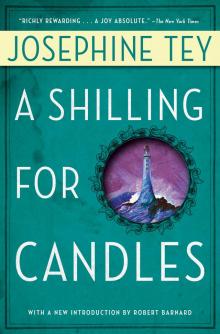 A Shilling for Candles
A Shilling for Candles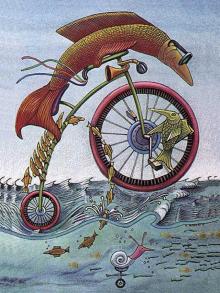 The Singing Sands
The Singing Sands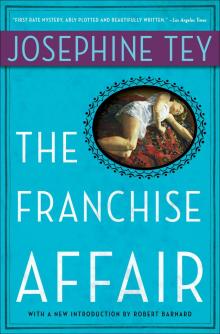 The Franchise Affair
The Franchise Affair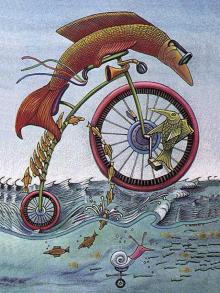 Daughter of Time
Daughter of Time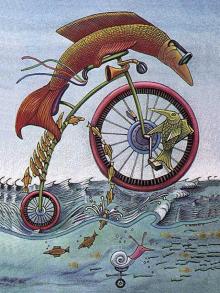 To Love and Be Wise
To Love and Be Wise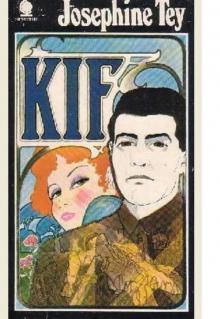 Kif
Kif The Expensive Halo: A Fable Without Moral
The Expensive Halo: A Fable Without Moral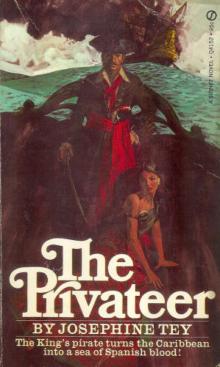 The Privateer
The Privateer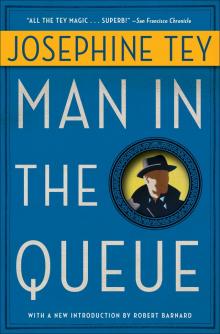 The Man in the Queue
The Man in the Queue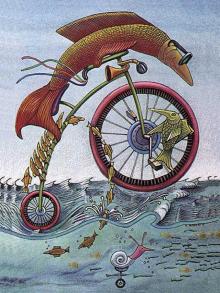 Miss Pym Disposes
Miss Pym Disposes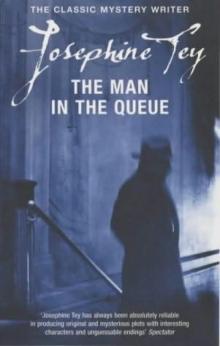 The Man in the Queue ag-1
The Man in the Queue ag-1 Brat Farrar
Brat Farrar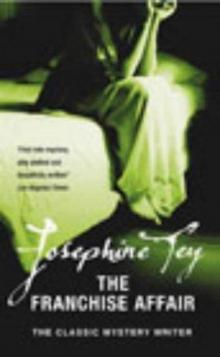 The Franchise Affair ag-3
The Franchise Affair ag-3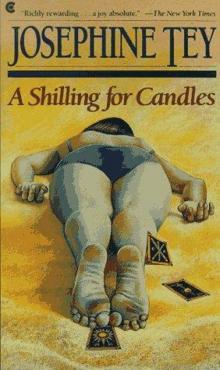 A Shilling for Candles ag-2
A Shilling for Candles ag-2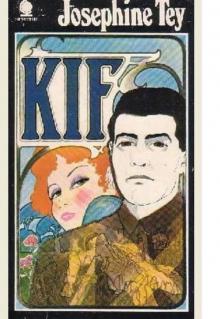 Kif: An Unvarnished History
Kif: An Unvarnished History The Expensive Halo
The Expensive Halo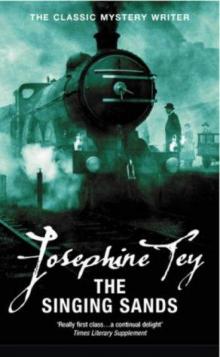 The Singing Sands ag-6
The Singing Sands ag-6 To Love and Be Wise ag-4
To Love and Be Wise ag-4